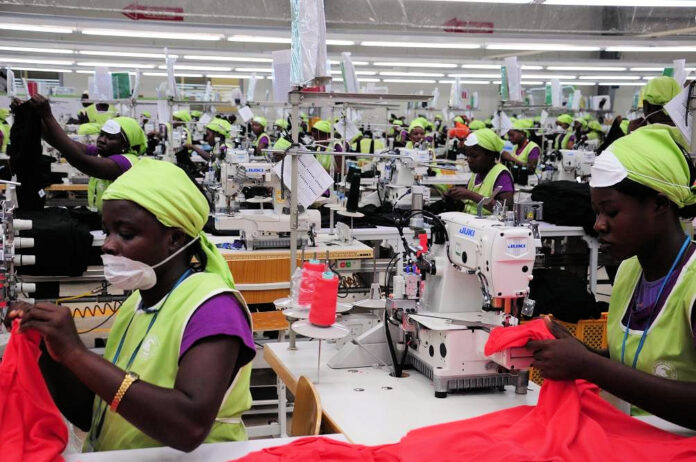(Français)
As the Biden administration works diligently to organize an invasion of Haiti – most recently with Kenya’s pledge to send 1,000 police officers – the sweatshop labor industry is celebrating.
American Apparel and Footwear Association (AAFA) president and CEO Steve Lamar applauded Kenya’s recent announcement that it would send 1,000 police officers in support of an “anti-gang” mission, telling the trade publication Sourcing Journal that it “reinforces that a country like Kenya has shared values, and shared prosperity, with the United States and with Haiti, and is trying to be a long-term partner. He added that, “There may also be some residual benefits to the U.S.-Kenya, and writ-large, the U.S.-Africa relationship.”
Haiti has emerged as a test-case for the Global Fragility Act, Washington’s strategy to maintain dominance in neocolonial outposts amid a resurgence from Russian and China, using diplomacy, aid and military force. This little known strategy, passed in 2019, is a central plank of foreign policy in the era of so-called Great Power competition”, and has been endorsed even by progressives like Rep. Ilhan Omar.

Rwanda, the Bahamas, Jamaica, Trinidad and Tobago, and CARICOM have also pledged to partake in the U.S.-organized military intervention. A UN resolution authored by the U.S. and Ecuador will soon be voted on at the Security Council, though is uncertain to pass because of potential vetoes from Russia and China.
As the U.S. cold war with China has bifurcated the global economy between east and west, apparel manufacturers have begun to move their operations to their other locales for cheap labor. A July, 2023 study found that 61% of apparel companies have stopped using Chinese operations as their primary supplier, a figure expected to reach 80% within two years. Among them are Next Level apparel, who in March 2023 announced it would move operations to Haiti and the neighboring Dominican Republic.
As the intervention – planned immediately following the July 7, 2021 assassination of President Jovenel Moïse – has gained steam, Republican members of Congress have pushed to renew the Haitian Hemisphere Opportunity through Partnership Encouragement (HOPE) Act and The Haitian Economic Lift Program (HELP) Act, which ensure Haitian products are exempted from U.S. tariffs.
These acts, created in 2005 and 2020, respectively, and set to expire in 2025, have played essential roles in the growth of sweatshop labor in Haiti. According to a US International Trade Commission report, U.S. imports of Haitian-made apparel quadrupled from $231 million in 2001 to $994 million in 2021, 67.9% ($751.3 million) of which entered under the HOPE and HELP Acts. Despite the benevolent language, these pieces of legislation have not benefited Haitian workers.
In 2011, Haïti Liberté, using classified diplomatic cables provided to it by Wikileaks, published a searing exposé of how the U.S. Embassy fought a wage hike in Haiti from $1.75 a day to $5 a day, winning $3 a day instead. The wretched conditions of Haitian assembly factory workers, which have scarcely changed in 40 years, is movingly documented in the 1983 feature documentary Bitter Cane, which won a second prize at the Cannes Film Festival that year.
The AAFA and several other garment industry associations, in a July 10 letter, urged Congress to pass the HOPE and HELP acts, writing that “Haiti’s apparel sector has the potential to play a transformative role” as the industry moves away from China. The letter adds “Without timely HOPE/HELP reauthorization, Haiti will not be seen as a viable nearshoring option for businesses.”

Industry figures like Paul Ryberg, President of the African Coalition for Trade, were more couched in their support for military intervention in Haiti, saying the security situation “create additional reasons for Congress to act more quickly than it might otherwise do, in order to send positive signals that companies will be able to continue to do business in Haiti.”
Ryberg is hoping Congress will renew the African Growth and Opportunity (AGOA) Act, originally passed in 2000, to expand apparel manufacturing in Kenya. Already the largest exporter of apparel products under the program, the apparel industry’s exodus from China has created more pressure to expand in Africa.
“Over the past two years, there’s been such a high level of interest in disinvestment from China that I think people are realizing that Africa is poised to become a major supplier,” Ryberg said.
Nonetheless, Haiti is only 600 miles south of Florida while Africa is 6,000 miles away, which explains Washington’s relentless determination to invade it to prevent a burgeoning revolution, block China’s growing influence in the region, and road-test their new GFA in a country that has often over the past century been used as their foreign and military policy laboratory.
This article was first published on Dan Cohen’s Substack site, Uncaptured Media.











[…] on Aug. 15. “You can see all of these interests coming together: the human rights industry, the apparel industry, the U.S. government, all of them coming together as a popular uprising with revolutionary […]
[…] « Vous pouvez voir tous ces intérêts se rassembler : l’industrie des droits de l’homme, l’industrie du vêtement, le gouvernement américain, tous se mettant ensemble alors qu’un un soulèvement populaire avec […]
[…] (English) […]